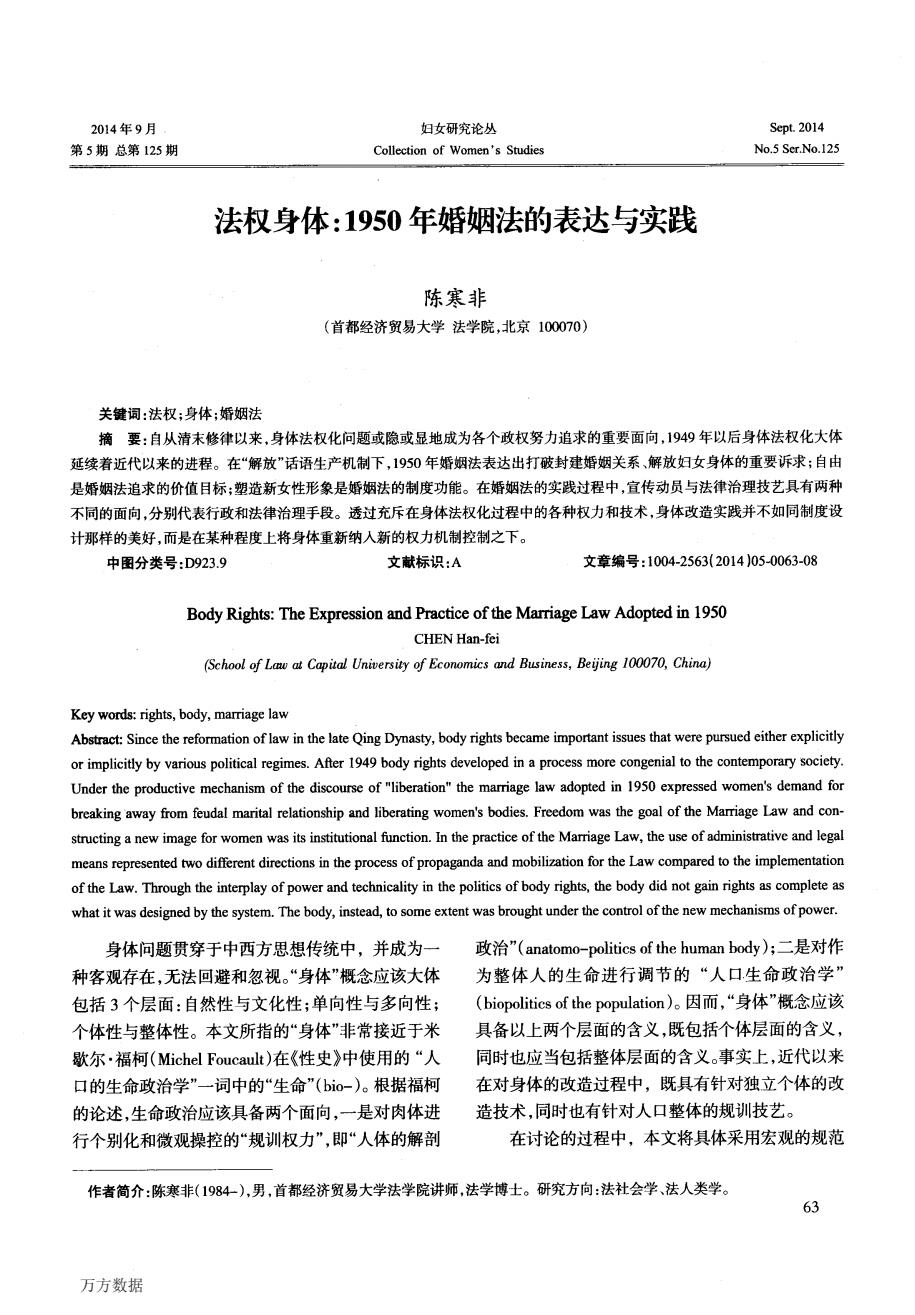正在加载图片...

2014年9月 妇女研究论丛 Sept.2014 第5期总第125期 Collection of Women's Studies No.5 Ser.No.125 法权身体:1950年婚姻法的表达与实践 陈寒非 (首都经济贸易大学法学院,北京100070) 关键词:法权;身体;婚姻法 摘要:自从清末修律以来,身体法权化问题或隐或显地成为各个政权努力追求的重要面向,1949年以后身体法权化大体 延续着近代以来的进程。在“解放”话语生产机制下,1950年婚姻法表达出打破封建婚姻关系、解放妇女身体的重要诉求;自由 是婚姻法追求的价值目标;塑造新女性形象是婚姻法的制度功能。在婚姻法的实践过程中,宜传动员与法律治理技艺具有两种 不同的面向,分别代表行政和法律治理手段。透过充斥在身体法权化过程中的各种权力和技术,身体改造实践并不如同制度设 计那样的美好,而是在某种程度上将身体重新纳人新的权力机制控制之下。 中图分类号:D923.9 文献标识:A 文章编号:1004-2563(2014)05-0063-08 Body Rights:The Expression and Practice of the Marriage Law Adopted in 1950 CHEN Han-fei (School of Law at Capital University of Economics and Business,Beijing 100070,China) Key words:rights,body,marriage law Abstract:Since the reformation of law in the late Qing Dynasty,body rights became important issues that were pursued either explicitly or implicitly by various political regimes.After 1949 body rights developed in a process more congenial to the contemporary society. Under the productive mechanism of the discourse of"liberation"the marriage law adopted in 1950 expressed women's demand for breaking away from feudal marital relationship and liberating women's bodies.Freedom was the goal of the Marriage Law and con- structing a new image for women was its institutional function.In the practice of the Marriage Law,the use of administrative and legal means represented two different directions in the process of propaganda and mobilization for the Law compared to the implementation of the Law.Through the interplay of power and technicality in the politics of body rights,the body did not gain rights as complete as what it was designed by the system.The body,instead,to some extent was brought under the control of the new mechanisms of power. 身体问题贯穿于中西方思想传统中,并成为一 政治”(anatomo-politics of the human body);二是对作 种客观存在,无法回避和忽视。“身体”概念应该大体 为整体人的生命进行调节的“人口生命政治学” 包括3个层面:自然性与文化性;单向性与多向性; (biopolitics of the population)。因而,“身体”概念应该 个体性与整体性。本文所指的“身体”非常接近于米 具备以上两个层面的含义,既包括个体层面的含义, 歇尔·福柯(Michel Foucault)在《性史》中使用的“人 同时也应当包括整体层面的含义。事实上,近代以来 口的生命政治学”一词中的“生命”(bio-)。根据福柯 在对身体的改造过程中,既具有针对独立个体的改 的论述,生命政治应该具备两个面向,一是对肉体进 造技术,同时也有针对人口整体的规训技艺。 行个别化和微观操控的“规训权力”,即“人体的解剖 在讨论的过程中,本文将具体采用宏观的规范 作者简介:陈寒非(1984-),男,首都经济贸易大学法学院讲师,法学博士。研究方向:法社会学、法人类学。 63 万方数据2014年9月 第5期总第125期 妇女研究论丛 Colleetion of Women’S Studies Sept.2014 No.5 Ser.N0.125 法权身体:1950年婚姻法的表达与实践 陈寒非 (首都经济贸易大学法学院,北京100070) 关键词:法权;身体;婚姻法 摘要:自从清末修律以来,身体法权化问题或隐或显地成为各个政权努力追求的重要面向,1949年以后身体法权化大体 延续着近代以来的进程。在“解放”话语生产机制下,1950年婚姻法表达出打破封建婚姻关系、解放妇女身体的重要诉求;自由 是婚姻法追求的价值目标;塑造新女性形象是婚姻法的制度功能。在婚姻法的实践过程中,宣传动员与法律治理技艺具有两种 不同的面向,分别代表行政和法律治理手段。透过充斥在身体法权化过程中的各种权力和技术,身体改造实践并不如同制度设 计那样的美好,而是在某种程度上将身体重新纳入新的权力机制控制之下。 中图分类号:D923.9 文献标识:A 文章编号:1004.2563(2014)05.0063.08 Body Rights:The Expression and Practice ofthe Marriage LawAdopted in 1950 CHEN Han.fei School ofLmr m Capital University ofEconomics and Business.Beo'ing 100070,China) Key words:rights,body,marriage law Abstract:Since the reformation oflaw in the late Qing Dynasty,body rights became important issues that were pursued either explicitly or implicitly by various political regimeN.After 1949 body fights developed in a process more congenial to the contemporary society. Under the productive mechanism of the discourse of”liberation”the marriage law adopted in 1 950 expressed women’S demand for breaking away from feudal marital relationship and liberating women’S bodies.Freedom was the goal of the Marriage Law and constructing a new image for women WaS its institutional function.In the practice ofthe Marriage Law,the use ofadministrative and legal means represented two different directions in the process ofpropaganda and mobilization for the Law compared to the implementation of the Law.Through the interplay ofpower and technicality in the politics ofbody rights,the body did not gain rights as complete as what it Was designed by the system.The body,instead,to some extent was brought under the control ofthe new mechanisms ofpower. 身体问题贯穿于中西方思想传统中,并成为一 种客观存在,无法回避和忽视。“身体”概念应该大体 包括3个层面:自然性与文化性;单向性与多向性; 个体性与整体性。本文所指的“身体”非常接近于米 歇尔·福柯(Michel Foucauh)在《性史》中使用的“人 口的生命政治学”一词中的“生命”(bio一)。根据福柯 的论述,生命政治应该具备两个面向,一是对肉体进 行个别化和微观操控的“规训权力”,即“人体的解剖 政治”(anatomo—politics of the human body);二是对作 为整体人的生命进行调节的“人口生命政治学” (biopolitics of the population)。因而,“身体”概念应该 具备以上两个层面的含义,既包括个体层面的含义, 同时也应当包括整体层面的含义。事实上,近代以来 在对身体的改造过程中,既具有针对独立个体的改 造技术,同时也有针对人口整体的规训技艺。 在讨论的过程中,本文将具体采用宏观的规范 作者简介:陈寒非(1984一),男,首都经济贸易大学法学院讲师,法学博士。研究方向:法社会学、法人类学。 63 万方数据